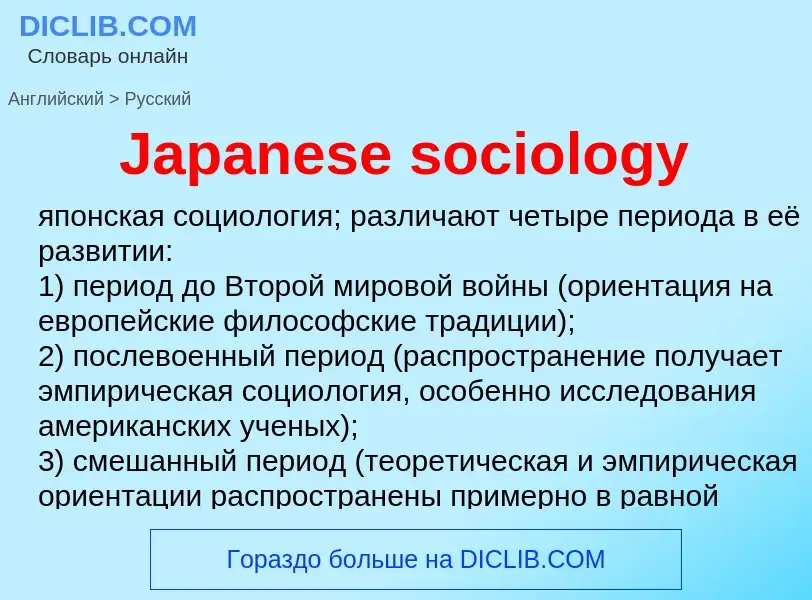Translation and analysis of words by ChatGPT artificial intelligence
On this page you can get a detailed analysis of a word or phrase, produced by the best artificial intelligence technology to date:
- how the word is used
- frequency of use
- it is used more often in oral or written speech
- word translation options
- usage examples (several phrases with translation)
- etymology
Japanese sociology - translation to russian
[səusiə'lɔdʒik-{səusiə'lɔdʒik}(ə)l]
общая лексика
социологический
прилагательное
общая лексика
социологический
Definition
Wikipedia
.jpg?width=120)
The sociology of culture, and the related cultural sociology, concerns the systematic analysis of culture, usually understood as the ensemble of symbolic codes used by a member of a society, as it is manifested in the society. For Georg Simmel, culture referred to "the cultivation of individuals through the agency of external forms which have been objectified in the course of history". Culture in the sociological field is analyzed as the ways of thinking and describing, acting, and the material objects that together shape a group of people's way of life.
Contemporary sociologists' approach to culture is often divided between a "sociology of culture" and "cultural sociology"—the terms are similar, though not interchangeable. The sociology of culture is an older concept, and considers some topics and objects as more or less "cultural" than others. By way of contrast, Jeffrey C. Alexander introduced the term cultural sociology, an approach that sees all, or most, social phenomena as inherently cultural at some level. For instance, a leading proponent of the "strong program" in cultural sociology, Alexander argues: "To believe in the possibility of cultural sociology is to subscribe to the idea that every action, no matter how instrumental, reflexive, or coerced [compared to] its external environment, is embedded to some extent in a horizon of affect and meaning." In terms of analysis, sociology of culture often attempts to explain some discretely cultural phenomena as a product of social processes, while cultural sociology sees culture as a component of explanations of social phenomena. As opposed to the field of cultural studies, cultural sociology does not reduce all human matters to a problem of cultural encoding and decoding. For instance, Pierre Bourdieu's cultural sociology has a "clear recognition of the social and the economic as categories which are interlinked with, but not reducible to, the cultural."

.jpg?width=200)
![[[Max Horkheimer]] (left, front), [[Theodor Adorno]] (right, front), and [[Jürgen Habermas]] (right, back), 1965 [[Max Horkheimer]] (left, front), [[Theodor Adorno]] (right, front), and [[Jürgen Habermas]] (right, back), 1965](https://commons.wikimedia.org/wiki/Special:FilePath/AdornoHorkheimerHabermasbyJeremyJShapiro2.png?width=200)

![[[Auguste Comte]] (1798–1857) [[Auguste Comte]] (1798–1857)](https://commons.wikimedia.org/wiki/Special:FilePath/Auguste Comte2.jpg?width=200)
![[[Émile Durkheim]] [[Émile Durkheim]]](https://commons.wikimedia.org/wiki/Special:FilePath/Emile Durkheim.jpg?width=200)
![Bust]] of [[Ferdinand Tönnies]] in [[Husum]], Germany Bust]] of [[Ferdinand Tönnies]] in [[Husum]], Germany](https://commons.wikimedia.org/wiki/Special:FilePath/Ferdinand Toennies Bueste Husum-Ausschnitt.jpg?width=200)
![[[Harrison White]] [[Harrison White]]](https://commons.wikimedia.org/wiki/Special:FilePath/Harrisonwhite.jpg?width=200)
![[[Ibn Khaldun]] statue in [[Tunis]], [[Tunisia]] (1332–1406) [[Ibn Khaldun]] statue in [[Tunis]], [[Tunisia]] (1332–1406)](https://commons.wikimedia.org/wiki/Special:FilePath/Ibn Khaldoun-Kassus.jpg?width=200)
![[[Jürgen Habermas]] [[Jürgen Habermas]]](https://commons.wikimedia.org/wiki/Special:FilePath/JuergenHabermas.jpg?width=200)
![[[Karl Marx]] (1818–1883) [[Karl Marx]] (1818–1883)](https://commons.wikimedia.org/wiki/Special:FilePath/Karl Marx.jpg?width=200)
![[[Max Weber]] [[Max Weber]]](https://commons.wikimedia.org/wiki/Special:FilePath/Max Weber 1894.jpg?width=200)
![The normal distribution is important in many fields of science, not just the [[social sciences]]}} The normal distribution is important in many fields of science, not just the [[social sciences]]}}](https://commons.wikimedia.org/wiki/Special:FilePath/Planche de Galton.jpg?width=200)
![A [[social network]] diagram: individuals (or 'nodes') connected by relationships A [[social network]] diagram: individuals (or 'nodes') connected by relationships](https://commons.wikimedia.org/wiki/Special:FilePath/Sna large.png?width=200)
![[[Herbert Spencer]] (1820–1903) [[Herbert Spencer]] (1820–1903)](https://commons.wikimedia.org/wiki/Special:FilePath/Spencer-detail.png?width=200)
![homefront]] and a departure from [[gender roles]] due to wartime necessity. homefront]] and a departure from [[gender roles]] due to wartime necessity.](https://commons.wikimedia.org/wiki/Special:FilePath/WomanFactory1940s.jpg?width=200)
